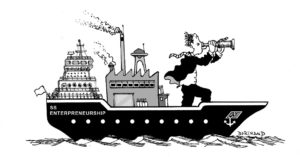Peter G. Klein, Department of Entrepreneurship Baylor University and Department of Strategy and Management Norwegian School of Economics, Waco, Texas, EUA, Peter_Klein@baylor.edu
 In the ThinkBox of the Revista de Administração (São Paulo) published in October 2016, Peter Klein argues “that the entrepreneurship literature focuses mostly on individuals, not organizations, and on firm creation, not firm operation”.
In the ThinkBox of the Revista de Administração (São Paulo) published in October 2016, Peter Klein argues “that the entrepreneurship literature focuses mostly on individuals, not organizations, and on firm creation, not firm operation”.
The author posits that “the judgment-based approach help us deal with the “classic” Coasean questions about firm emergence, boundaries, and internal organization? As Knight (1921) pointed out, entrepreneurial judgment is non-contractible. In other words, if judgment represents residual decision authority about the use of productive assets, then judgment cannot be delegated without selling the asset. An entrepreneur-owner can seek advice, of course, but bears the ultimate responsibility for soliciting advice, following or rejecting advice, and making final decisions. To exercise judgment, then, the entrepreneur must be an owner—i.e., must start and/or operate a firm. Put differently, a prospective entrepreneur (or team of entrepreneurs) may be unable to communicate expectations about a project or business plan—a specific way of combining heterogeneous capital assets to serve future consumer wants—in such a way that other agents can assess its economic implications. Organizing a firm may also be a low-cost means of experimentation with different asset combinations and employment contracts, under the coordination of the entrepreneur (K. Foss, 2001). The existence of the firm can thus be explained by a specific category of transaction costs, namely, those that close the market for entrepreneurial judgment.
“In this approach, a firm is an entrepreneur plus the alienable assets she owns and controls. The multi-person firm includes multiple owners and/or employees who may exercise “derived judgment” on the part of the entrepreneur-owner or owners, who exercise judgment in selecting, monitoring, and delegating decision authority to these employees” (p. 325).
Therefore, Klein shows that “the theory of the firm, in turn, can benefit further by thinking more systematically about firm emergence, how firms adapt and respond to economic change, and how established firms can be more entrepreneurial and innovative. Doing so requires going beyond the production-function approach to the firm, and even beyond the transaction cost, property-rights, and agency-theoretic perspectives that dominate the modern theory of the firm. This will help the scholarly community exploit more fully the potential gains from trade between these two fields” (p. 325).
Para ler o artigo, acesse
KLEIN, P. G. Why entrepreneurs need firms, and the theory of the firm needs entrepreneurship theory. Rev. Adm. (São Paulo) [online]. 2016, vol.51, n.3, pp.323-326. [viewed 17th October 2016]. ISSN 1984-6142. DOI: 10.1016/j.rausp.2016.06.007. Available from: http://ref.scielo.org/kds87v
Link externo
Revista de Administração (São Paulo) – RAUSP – www.scielo.br/rausp
Como citar este post [ISO 690/2010]:












Últimos comentários